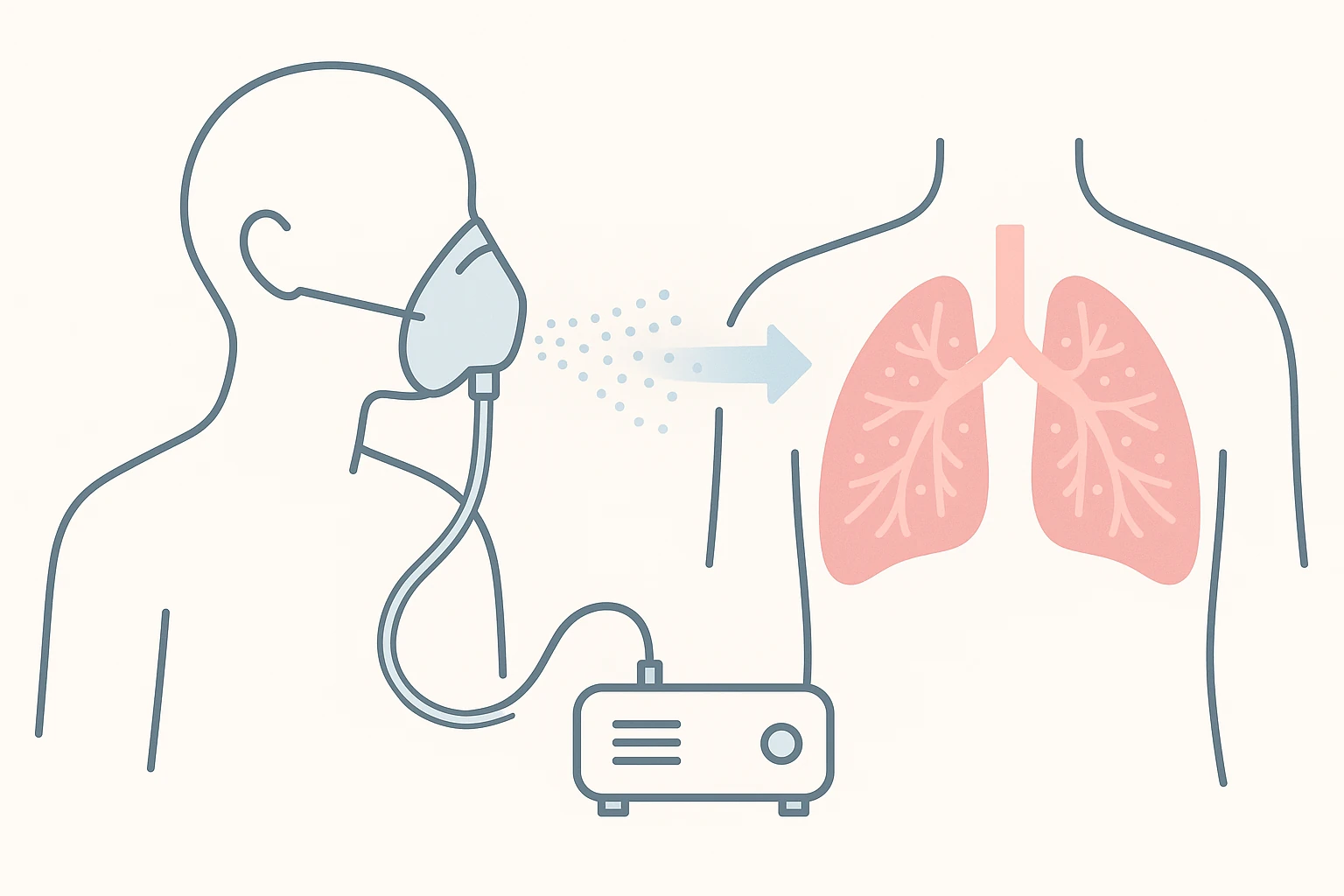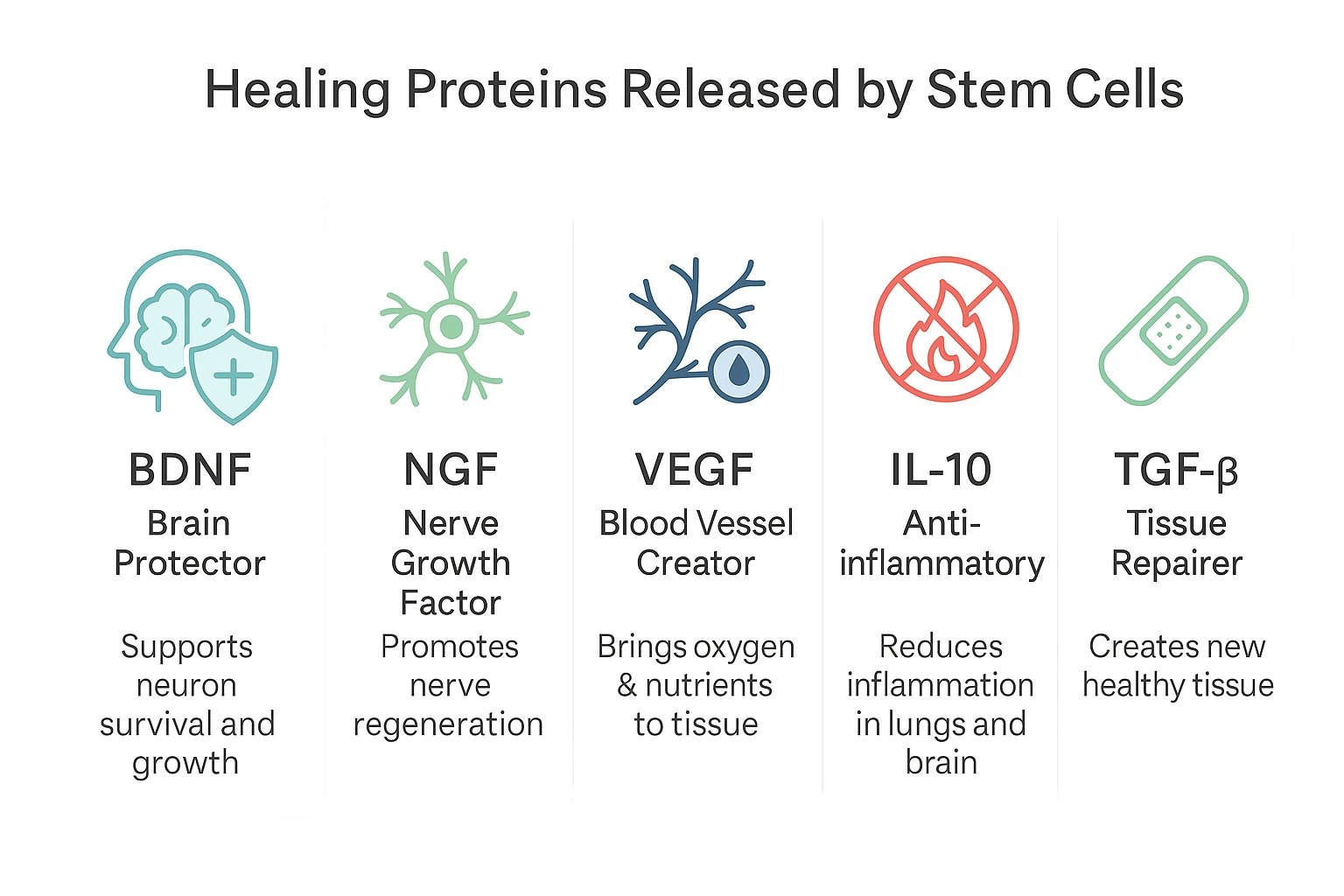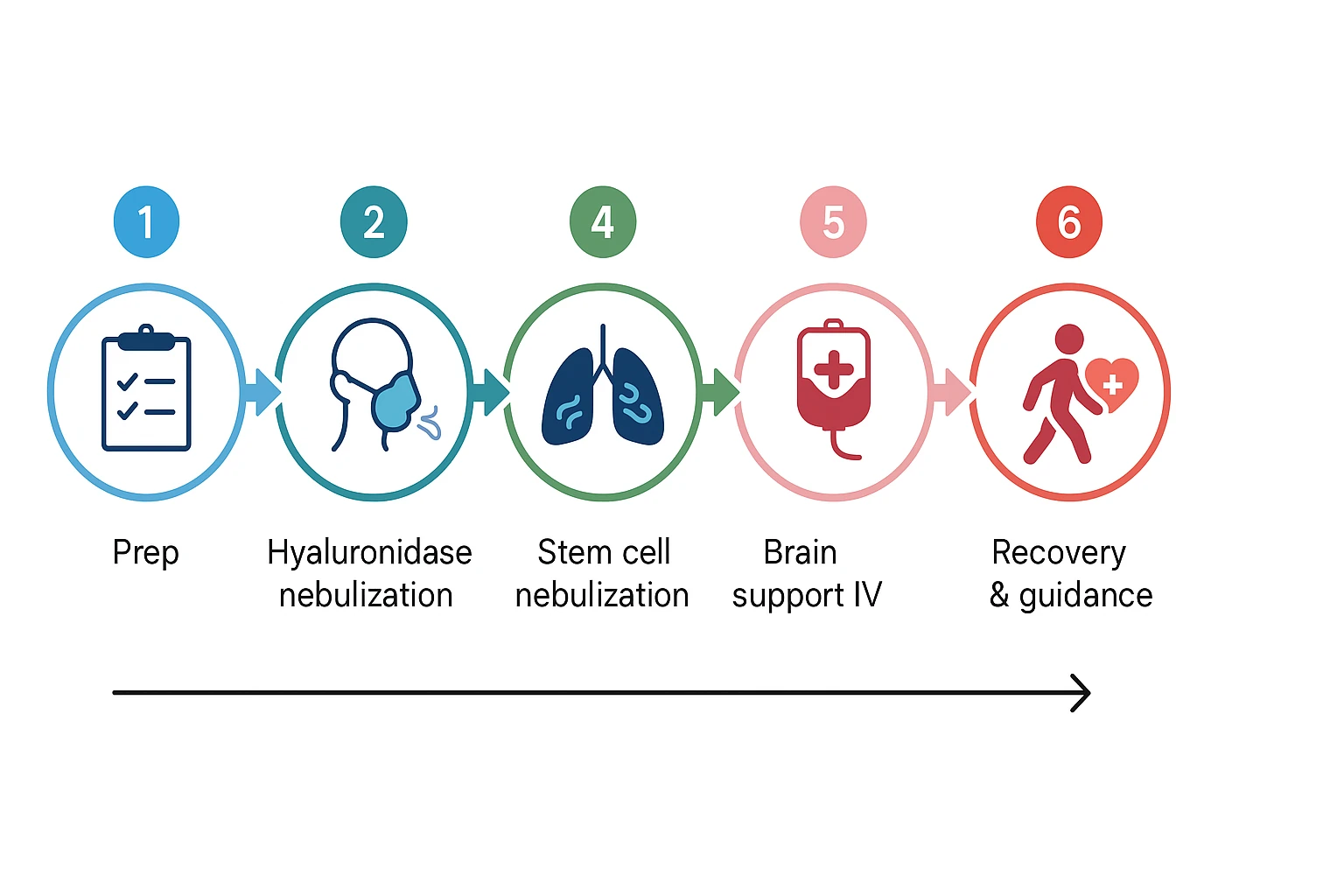Anti-Aging
Stem Cell Treatment
Finding Relief Through Nebulized Stem Cell Therapy: A Regenerative Approach for Lung and Brain Health
If persistent respiratory issues or neurological challenges have been limiting your daily activities, you might consider exploring nebulized stem cell therapy, a regenerative treatment designed to reduce inflammation, support healing, and restore function. This treatment addresses various conditions including COPD, asthma, pulmonary fibrosis, stroke recovery, traumatic brain injury, and multiple sclerosis.
Clinical studies show that many patients experience significant improvements in breathing function and neurological symptoms, with some research reporting 91% survival rates in severe cases. Unlike treatments that only mask symptoms temporarily, nebulized stem cell therapy works at the cellular level to support your body's natural repair processes. In this comprehensive guide, we'll explore the science behind this treatment, what to expect during the process, and help you understand if this regenerative approach could be the key to reclaiming the quality of life you've been missing.
What Is Nebulized Stem Cell Therapy?
Stem cells function as your body's cellular reserve system. Unlike specialized cells that perform one specific job, stem cells remain undifferentiated until needed, then transform into whatever cell type your body requires. This remarkable ability makes them particularly valuable for treating both lung and brain conditions.
In nebulized stem cell therapy, we use carefully screened mesenchymal stem cells that have been extensively tested for safety and potency. When delivered through a specialized nebulizer device, these cells travel directly to your lungs through inhalation. With hyaluronidase preparation, they can also reach brain tissue through the nasal passages. The cells respond to chemical signals from injured areas, releasing anti-inflammatory compounds and recruiting other healing factors to the site. The process amplifies your body's existing repair mechanisms in the exact location where healing is needed most.

The Natural Decline of Your Body's Repair System
Research shows that by age 35, you've lost approximately 5–10% of your original stem cell count. By age 50, you've lost around 30–50%. By age 70, you've lost about 70–90% of your original stem cell capacity. This steady decline parallels the increasing difficulty many people experience with healing and recovery as they age.
This helps explain why respiratory infections that cleared quickly in your twenties can become chronic problems in your fifties. Your younger self had abundant cellular resources to address any damage. Your older self has significantly fewer healing cells available, which often means incomplete healing and persistent inflammation.
The progressive loss of stem cells has a direct effect on both lung and brain health. Lung tissue requires constant repair due to environmental exposure, while brain tissue depends on stem cells for neuroprotection and regeneration. When stem cell numbers drop too low, damage begins accumulating faster than your body can address it.
The Science of Nebulized Stem Cell Therapy
When stem cells are delivered through nebulization, they immediately go to work through a sophisticated healing process. First, these cells detect inflammation in your lungs and brain through special chemical messengers that damaged tissue releases. This allows them to identify exactly where repairs are needed.
The stem cells then begin producing healing proteins called growth factors. Here's what each one does:
Healing Proteins Released by Stem Cells

Complete Treatment Experience: What to Expect
The entire nebulized stem cell therapy procedure takes approximately 90-120 minutes from start to finish. Unlike invasive procedures, our approach uses a comfortable breathing mask, eliminating the need for surgery or painful injections into affected areas.
What to Expect During Your Nebulized Treatment
Since we deliver stem cells through inhalation, you won't experience the discomfort associated with injections or surgical procedures. The treatment involves breathing in a mist containing 25 million mesenchymal stem cells. Most patients describe the experience as similar to a standard breathing treatment - relaxing and completely painless. The IV portion for brain support nutrients involves only a standard IV placement.
The Steps Involved in Your Stem Cell Nebulizer Treatment
Here's exactly what happens during your treatment:
- Pre-treatment preparation: Medical team reviews your condition and prepares the nebulizer equipment
- IV placement: Comfortable IV line placed for brain support nutrients
- Hyaluronidase nebulization: Inhaled preparation to enhance stem cell absorption (15-20 minutes)
- Stem cell nebulization: 25 million mesenchymal stem cells delivered via nebulizer (20-30 minutes)
- Brain support IV: Glutathione, NAD+, and High Dose Vitamin C administered (45-60 minutes)
- Post-treatment care: Brief monitoring period and personalized recommendations provided
To enhance results, we complement the stem cell nebulizer treatment with:
- Customized breathing exercise protocols
- Nutritional supplementation guidance
- Lifestyle modification recommendations
- Follow-up monitoring and support

Recovery and Post-Treatment Care
Your recovery begins immediately after treatment. Here's what to expect:
First 24-48 hours: Some patients report feeling more energetic or breathing easier. This indicates the stem cells are beginning their work. Normal activities can be resumed immediately with no downtime required.
First week: Continue normal activities while avoiding exposure to respiratory irritants. Many patients notice early improvements in breathing capacity or mental clarity. No special restrictions needed.
Weeks 2-4: The anti-inflammatory effects become more noticeable. Patients with lung conditions often report easier breathing, while those with neurological conditions may notice improved coordination or cognitive function.
Months 1-6: This is when the real healing occurs. Stem cells continue working to repair tissue, with most patients experiencing progressive improvement throughout this period. Peak benefits often appear between months 2-4.
Investment and What's Included
Complete Treatment Package: USD $2,500 to USD $3,000
Your investment covers:
- Initial medical consultation and evaluation
- 25 million mesenchymal stem cells
- Nebulized hyaluronidase preparation
- Brain IV with Glutathione, NAD+, and High Dose Vitamin C
- All medical supplies and equipment
- Personalized supplement recommendations
- Lifestyle and wellness guidance
- Follow-up support during recovery
Comparing Treatment Options
Research on Nebulized Stem Cell Therapy Success Rates
The body of scientific evidence supporting nebulized stem cell therapy continues to expand, with research from leading medical institutions demonstrating its therapeutic potential. Multiple clinical trials and comprehensive studies have evaluated the safety and effectiveness of this innovative delivery method.
A major 2021 study examining 24 COVID-19 patients treated with nebulized stem cells found that 91% of patients survived compared to 42% in the control group, with significant improvements in breathing function persisting throughout recovery.
Comprehensive research published in 2021 analyzed 139 patients receiving nebulized stem cell therapy for severe respiratory conditions. The findings showed that 42% of treated patients experienced meaningful clinical improvement compared to only 17% in the standard treatment group.
An extensive 2022 analysis demonstrated that nebulized stem cell therapy was safe and effective for lung conditions, with all patients completing treatment without adverse events and showing improved lung function on imaging.
Research from 2020 investigating nebulized therapy for pulmonary fibrosis found that patients receiving treatment improved their lung function by 7.8% while untreated patients declined by 5.9%. The study showed patients could walk 26% farther after treatment.
The latest research from 2025 examining nebulized stem cells followed 24 patients for a full year. The trial documented complete safety with no allergic reactions and stable organ function throughout the monitoring period.
This growing body of evidence from respected medical journals and institutions worldwide demonstrates that nebulized stem cell therapy offers a scientifically-supported treatment option. The consistency of positive outcomes across multiple studies, combined with the excellent safety profile, provides a strong foundation for considering this regenerative approach.
Frequently Asked Questions
What Is Stem Cell Nebulization?
Stem cell nebulization is a treatment method where stem cells are converted into a fine mist that you breathe in through a nebulizer device. This allows the stem cells to reach your lungs directly through inhalation, and with special preparation, can also reach brain tissue through the nasal passages. The treatment uses 25 million mesenchymal stem cells delivered over a 20-30 minute comfortable breathing session.
How Does Nebulizing Stem Cells Work?
Nebulizing stem cells works by creating tiny droplets containing stem cells that travel directly into your lungs when you breathe. Once in the lungs, these cells detect areas of inflammation or damage and begin releasing healing factors. The stem cells can reduce inflammation, support tissue repair, and help your body's natural healing processes. For brain conditions, we first use hyaluronidase to help the cells cross from the nasal passages into brain tissue.
Is Nebulized Stem Cell Therapy Safe?
Clinical studies show nebulized stem cells have an excellent safety profile. Research involving over 170 patients has reported zero serious adverse events from nebulized stem cell therapy. Unlike other delivery methods, nebulization doesn't require needles or invasive procedures. Patients experience no downtime and can return to normal activities immediately after treatment.
Is Nebulized Stem Cell Therapy Available in Mexico?
Our clinic offering nebulizer stem cell therapy in Mexico is located in Sayulita, Nayarit, approximately 45 minutes from Puerto Vallarta International Airport. We specialize in regenerative treatments using advanced nebulizer protocols for both lung and brain conditions.
Conclusion
Nebulized stem cell therapy offers a treatment option that works with your body's natural healing processes. By supplementing your declining stem cell count and delivering healing factors directly to affected tissues, this approach addresses the underlying causes of respiratory and neurological conditions rather than just managing symptoms.
The research shows positive outcomes, with many patients experiencing improved breathing, enhanced neurological function, and better quality of life. While individual results vary, the combination of scientific evidence, non-invasive delivery, and excellent safety profile makes nebulized stem cell therapy an option worth considering for those seeking alternatives to conventional treatments.
If you're interested in learning more about whether nebulized stem cell therapy is right for your condition, contact us to schedule a consultation to discuss your specific situation and treatment options.
Individual results may vary. No treatment outcomes are guaranteed. This information is for educational purposes only and should not replace professional medical advice. Statements not evaluated by the FDA or COFEPRIS.
Treatment
- Medical consultation
- We nebulized hyaluronidase to break down the mucus membrane for better absorption of stem cells.
- 25 million Mesenchymal Stem Cells via Nebulizer
- Brain IV + Glutathione + NAD+ and High Dose Vitamin C
- Recommended supplement to take.
- Recommendation on things to do to enhance wellness.
